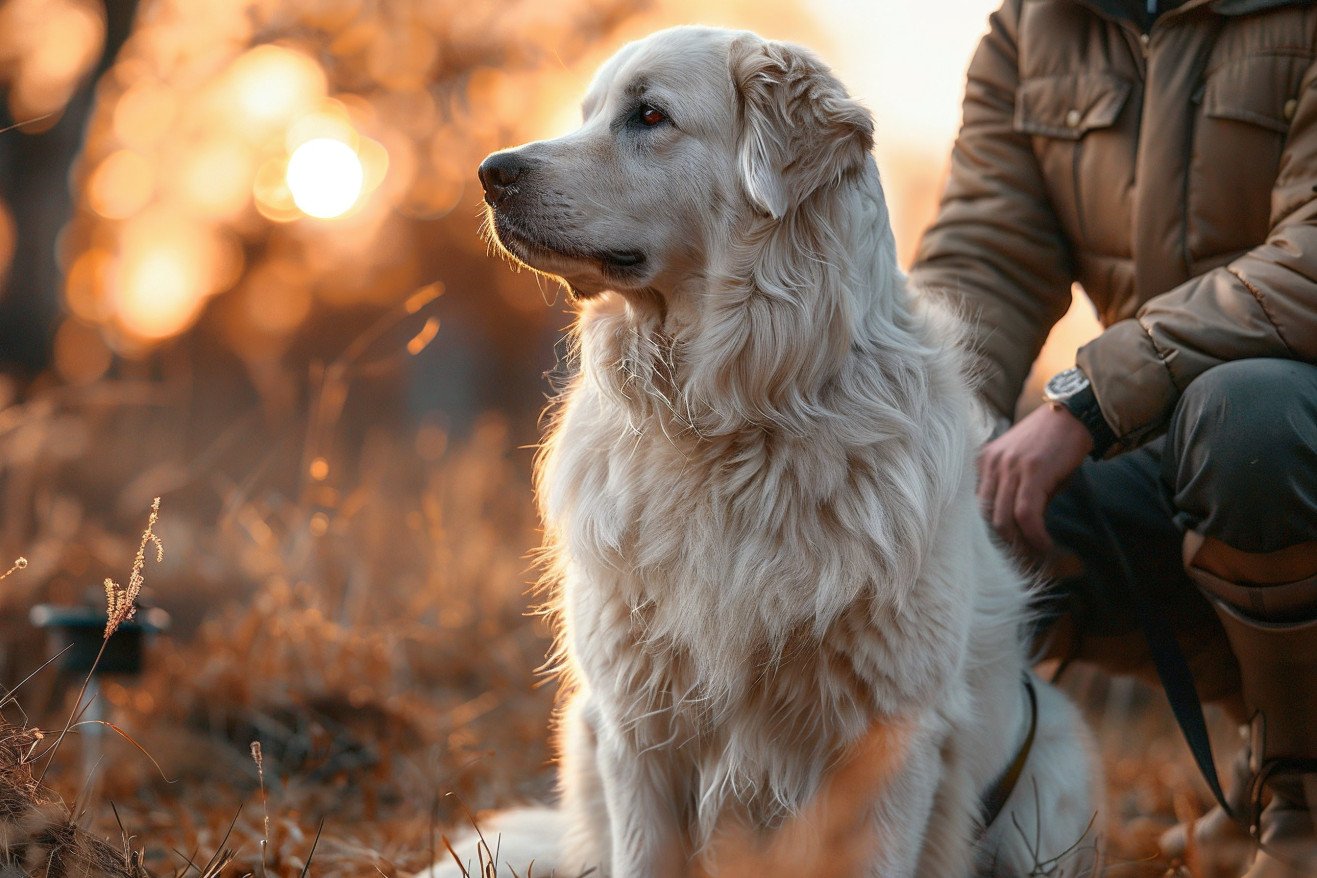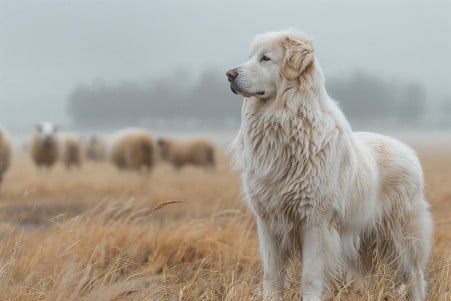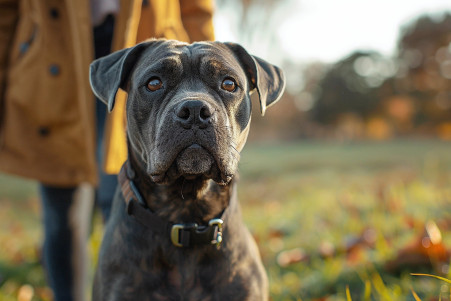Dealing With Great Pyrenees Behavior Issues: Tips for Successful Training
13 March 2024 • Updated 12 March 2024

The regal yet sometimes difficult behavior of the Great Pyrenees can leave even the most seasoned dog parents scratching their heads. Some of the most common Great Pyrenees behavior issues include independence, barking at night, and being strong-willed. However, these behaviors can be managed by positive training methods, firm leadership, and early socialization to reduce their guarding tendencies and prevent aggression.
To better understand Great Pyrenees behavior problems, we’ll be looking at research and expert opinions from animal behaviorists, vets, and professional dog trainers. We’ll also be examining the genetic factors, training methods, and environmental factors that contribute to this breed’s behavior. This exploration will help you better understand the root causes of the most common behavior issues and give you actionable steps to improve your relationship with your Great Pyrenees.
What are the solutions to common Great Pyrenees behavior issues?
Behavioral Challenges of the Great Pyrenees
Great Pyrenees owners may face a number of behavioral issues, such as destructiveness and barking. These large dogs are known for their chewing, and they often resort to chewing on furniture or other items in the home when they are bored or not getting enough exercise, according to My Great Pyrenees.
Their protective nature also leads to barking at night, and it’s important for owners to know what causes this so they can control it, according to PetHelpful.
Great Pyrenees can be difficult to train because of their stubbornness, and their intelligence and independence can make them less responsive to traditional training methods, so a positive, patient training style is often needed. They also have a hard time with housebreaking because they prefer to be outside, so it’s important to be consistent and use crate training.
In addition, their background as livestock guardians can lead to separation anxiety and pulling on the leash. If they aren’t trained and socialized properly, their protective nature can lead to aggression or herding behavior, even though this is one of the things that makes them good guardians.
Medium, a site that covers a variety of topics, including pets, includes tips from dog behavior specialist Dr. Sarah Martinez on an all-encompassing plan that takes the breed’s traits into account to deal with these problems.
While these issues may seem overwhelming, understanding the behavioral genetics of the breed can help you better understand how to manage them.
The Genetic Components of Great Pyrenees Temperament
A study published in ScienceDirect found that behavioral traits in dogs have a low broad-sense heritability, which calls into question the reliance on behavioral assessments in dog breeding. While this is important to note in terms of understanding Great Pyrenees temperament, it also means that the relationship between genetics and environment is more complicated than previously believed.
That said, there are breed-specific genetic factors at play that contribute to common behavioral issues like willfulness, protectiveness, and barking at night.
A deeper dive into a study by James A. Serpell published in PMC showed that there are certain behaviors that have high broad-sense heritability across dog breeds and that several genetic loci have been identified that are associated with these behaviors.
This genetic architecture, which includes genes that are expressed in the brain, explains the differences in behavior between dog breeds, including those that are seen in Great Pyrenees. This further emphasizes the importance of genetics in behavioral issues and can help guide ethical breeding.
The impact on Great Pyrenees is significant. While genetics don’t explain everything about behavior, knowing about the breed’s genetic predispositions can help breeders and owners better understand and deal with potential issues. This is in addition to the role that socialization and training play in helping to ensure that dogs are well-adjusted, which is important for creating a good relationship between the regal Great Pyrenees and their human family members.
Early Socialization and Its Impact on Great Pyrenees
Early life experiences play a large role in shaping the behavior of Great Pyrenees. Studies have shown that early socialization has a big impact on how well-adjusted dogs will be as adults. This is especially important for livestock guardian breeds like the Great Pyrenees, as early exposure to different stimuli in a controlled, positive way is necessary to prevent behavioral problems like aggression and fear.
A study in Veterinary Medicine: Research and Reports found that puppies who were well-socialized were more likely to show positive social behaviors toward people and fewer undesirable behaviors as adults.
Behavioral issues can be prevented and managed with training that is tailored to the needs of the breed. A narrative systematic review in PMC explains that sensitive periods of development are periods when positive early experiences are important for trainers to create dogs that are well-adapted as adults.
For Great Pyrenees, the socialization period between 3 and 12 weeks is especially important. The study found that poor socialization during this time can lead to behavioral issues in adulthood, which is especially worrisome given the breed’s protective nature.
Understanding the importance of socialization and training during the formative years of Great Pyrenees can help not only with current behavioral issues but also set the stage for their overall health and well-being. In addition to the many other factors that impact dog behavior, the relationship between diet and nutrition is another important part of the picture.
Diet and Great Pyrenees Behavior
While it’s clear that diet can impact behavior in dogs, the same is true for the Great Pyrenees. An article in PubMed notes that there are a number of biological processes that can impact behavior based on the composition of a dog’s diet.
This is because some of the most important nutrients, including tryptophan and tyrosine, are precursors to neurotransmitters such as serotonin and catecholamines, which are involved in mood and behavior. Tryptophan, for example, has been shown to lead to lower aggression and higher stress resilience in dogs.
A comprehensive review of the impact of diet on aggression, stress responses, and cognitive function in dogs was published in Nutrition Research Reviews. It found that polyunsaturated fatty acids (PUFAs), and specifically docosahexaenoic acid (DHA), are important for brain development and can impact the dopaminergic and serotonergic systems that are involved in behavior.
Meanwhile, a Ph.D. thesis from Wageningen University looked at the impact of dietary fiber on satiety-related behaviors and found that different types of dietary fiber can impact feeding motivation, which could impact activity and aggression.
While the relationship between diet and behavior is clearly complicated, this research suggests that it may be possible to impact Great Pyrenees behavior issues through personalized nutrition plans that can help reduce certain behavioral traits and improve the impact of training.
Training Your Great Pyrenees
The best training methods for Great Pyrenees are those that take into account their unique personality traits. Positive reinforcement training is the most effective way to train these independent dogs, while aversive training can lead to more stubbornness and even make behavioral issues worse.
The Great Pyrenees Club of America recommends early socialization, which includes housetraining, leash training, and learning the word no to help ensure a well-behaved pet. Owners should work to develop a relationship with their dogs that is based on mutual respect, which can be done through patience, consistency, and gentle but firm handling.
To help ensure that the Great Pyrenees stay interested in training, it’s recommended that training sessions be kept short and varied because the breed can get bored with repetitive tasks. To help curb behaviors like nocturnal barking and herding, the National Great Pyrenees Rescue recommends using environmental management, which can include limiting the dog’s exposure to things that trigger barking and providing the dog with a quiet area in the home.
The breed’s protective instincts can be managed by creating a structured environment that ensures the dog comes inside at the same time every day and is kept in a calm environment, according to the Great Pyrenees Club of Southern Ontario.
The breed’s barking is a natural part of their role as a guardian dog, and while it can be managed, it’s not realistic to expect that it can be eliminated. Knowing and respecting the breed’s natural instincts will help owners create a peaceful living situation.
Bringing It All Together: The Key to Understanding Great Pyrenees Behavior
As we’ve discussed the many challenges associated with Great Pyrenees behavior issues, we’ve also learned about the many nuances that make this breed both wonderful and difficult to work with. We’ve talked about everything from common behavioral issues like stubbornness, nocturnal barking, and a strong-willed disposition to the breed’s tendency to develop certain problematic behaviors like destructiveness and excessive barking.
We’ve also talked about how these issues can be addressed through positive reinforcement, consistent training, and early socialization, but it’s important to understand the root causes of these problems.
We’ve also talked about the genetic factors that play a role in Great Pyrenees behavior, including breed-specific traits that require a unique approach to training and socialization. We’ve also discussed the importance of early life experiences, especially during sensitive periods of development, in shaping the Great Pyrenees’ behavior as an adult, which is why early socialization is so important.
We’ve also learned that diet can play a role in behavior, with certain nutrients impacting mood and aggression. And we’ve discussed training and management tips that will help you work with your Great Pyrenees’ nature and instincts.
Ultimately, successfully working with a Great Pyrenees to create a happy, healthy, and well-behaved dog will require a combination of commitment, patience, and an understanding of training, socialization, genetics, and nutrition. Each of these factors will play a role in the health and happiness of these majestic dogs and will help you build a relationship with your Great Pyrenees that is based on mutual understanding and respect.


